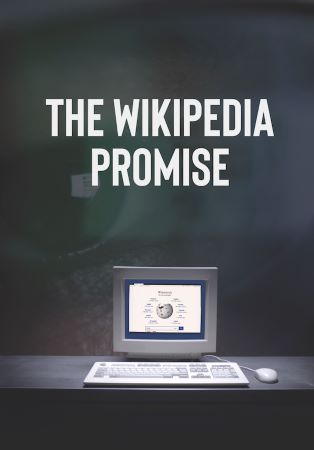
The Wikipedia Project 2021
Distributed by The Video Project, 145 - 9th St., Suite 230, San Francisco, CA 94103; 800-475-2638
Produced by André Schäffer
Directed by Lorenza Castella and Jascha Hannover
Streaming, 52 mins
High School - General Adult
Communication; Internet; Mass Media
Date Entered: 07/08/2022
Reviewed by Laura JenemannSince its release on January 15, 2001, Wikipedia has occupied a truly unique place in the history of the internet: it is both user-created and a type of encyclopedia, run by a non-profit based organization and written by volunteers, and came into existence before many common social media platforms were developed. The Wikipedia Promise provides the past history and explores current topics related to this enigmatic website, while acknowledging that the aim of Wikipedia to be “the sum of all knowledge” is problematic.
The film covers the early days of Wikipedia from its creation by Jimmy Wales and Larry Sanger, or as he calls himself, ex-founder: “I don’t want to have anything to do with it.” Sanger parted with Wikipedia over topics that are still discussed today: getting academics involved and getting trolls out. And yet since Sanger’s departure, these two topics have become key components of Wikipedia: in the years since Wikipedia’s founding, academics have become involved through the Wiki Education program, and Wikipedia developed the system of an administrative structure where experienced Wikipedia editors – still volunteers - can moderate content.
The film’s exploration of the who-and-how behind what readers of Wikipedia read is the film’s strength. Wikipedians, as its editors are called, explain how Wikipedia is filled with gaps: gaps in who writes content, gaps in what sources can be used for writing Wikipedia, and consequently, gaps in what ends up getting into Wikipedia. Two examples of this provide a unique opportunity for discussion of larger issues related to the internet and communication. The first is in the discussion of the LSJbot created to fill these gaps that explores questions of what is the role of bots in the Wikipedia community, and how should a bot be treated among human Wikipedia editors? And, the second is in the discussion of communities where citable sources are in oral forms, and therefore outside of the guideline, at least for English language Wikipedia, that “Wikipedia articles should be based on reliable, published sources.” If oral knowledge is the critical form of knowledge in a community, how can Wikipedia represent the “sum of all knowledge” if these sources are left out?
Is Wikipedia a reliable source? The film’s coverage of this often-debated question is intertwined with the issue of the who, how, and what of Wikipedia. While a Wikipedian from France explains that Wikipedia has a relevance criteria that “you shouldn’t write about your local bakery or a local artist” and that there “must be an entry in a traditional encyclopedia” or “the subject of at least two articles in the national or international press,” this criteria differs from the criteria of English language expressed on the page Wikipedia:Reliable sources in the English language Wikipedia.
That Wikipedia has caused so many of its readers to ask, in the words of journalist, Marvin Oppong, “where does this information come from, can it be true?” is the reason why I recommend this brief film for classes discussing similar issues in media, the internet, or information literacy. And specifically, that Wikipedia is not only the subject of these discussions, but having these discussions about itself, within the pages of its encyclopedia in multiple languages, in pages like Wikipedia:Wikipedia is not a reliable source, and Reliability of Wikipedia, is why this film could help serve those seeking to educate themselves and others on these issues.
Awards: Official selection: The Jozi Film Festival, DOCUTAH, Chagrin Documentary Film Festival, Free Speech Film Festival, Ananse Cinema International Film Festival
Published and licensed under the Creative Commons Attribution 4.0 license. Anyone can use these reviews, so long as they comply with the terms of the license.